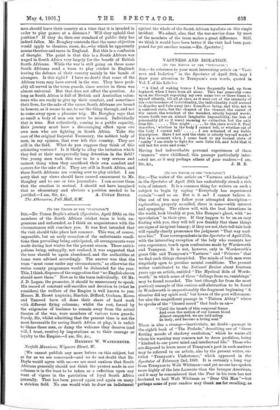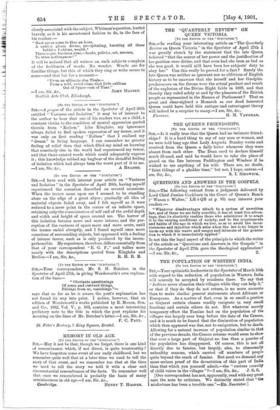[TO THE EDITOR OF THE "SPECTATOR."]
Sin,—The writer of the article on " Vastness and Isolation " in the Spectator of April 20th has undoubtedly struck a rich vein of interest. It is a common thing for writers on such a subject to begin by saying " Everybody has experienced certain "—and so on. But is it so ? I cannot beliei'e it. One out of ten may follow your attempted description— explanation., properly so-called, there is none—with interest and sympathy. The others will, with the best intentions in the world, look blankly at you, like Banquo's ghost, with "no speculation" in their eyes. If they happen to be on an easy footing with you, they will tell you frankly that these things are signs of incipient lunacy ; if they are not, their tell-tale look will equally clearly pronounce the judgment "That way mad- ness lies." Your correspondents in the Spectator of April 27th. with the interesting exception of the lady who recounts her own experience, touch upon confessions made by Wordsworth and Tennyson. It is not, however, only in Wordsworth's great Ode and Tennyson's " Vastness " and " Princess " that we find such things chronicled. The minds of both men were singularly open to peculiar mental conditions. The present writer contributed to the National Review about fourteen years ago an article, entitled " The Mystical Side of Words- worth," in which some of these " fallings from us, vanishings" may be found recorded. The best (though far from the most poetical) example of this curious self-abstraction to be found in Wordsworth is unquestionably the fragment beginning " A slumber did my spirit seal," but lovers of the poet will remem. ber also the magnificent passage in " Tintern Abbey" where he speaks of the "blessed mood" that leads us on- " Until the breath of this corporeal frame And even the motion of our human blood Almost suspended, we are laid asleep In body, and become a living soul."
There is also a strange—inarticulate, no doubt—passage in the eighth book of " The Prelude," describing one of " those fleeting moods of shadowy exultation," which he warns all • whom his warning may concern not to deem profitless, being " kindred to our purer mind and intellectual life." Those who are disposed to learn more of Tennyson's part in such matters may be referred to an article, also by the present writer, en. titled " Tennyson's Undertones," which appeared in the Spectator of February 2nd, 1889. It is certainly a long way • from Tennyson to Walt Whitman—and yet no one has spoken more highly of the late Laureate than the brusque American, and it may be remembered that the Peer in his turn has not hesitated to hail Walt Whitman as " Dear Old Man "—but perhaps some of your readers may thank me for. recalling, as
closely associated with the subject, Whitman's question, hurled bravely, as it is his accustomed fashion to do, in the face of his readers :- " Bast never come to thee an hour,
A sudden gleam divine, precipitating, bursting all these
bubbles fashions, wealth ?
These eager, business aims,—books, politics, art, amours, To utter nothingness ? "
It will be noticed that all writers on such subjects complain of the feebleness of words. No wonder. Words are for familiar things, but this of which they sing or write seems to
come—and that but for a moment-
" From an ultimate dim Thule—
From a wild, weird clime that lieth sublime Out of Space—out of Time."
—I am, Sir, &c., JOHN FIOGBEN.
Scottish Arts Club, Edinburgh.











































 Previous page
Previous page